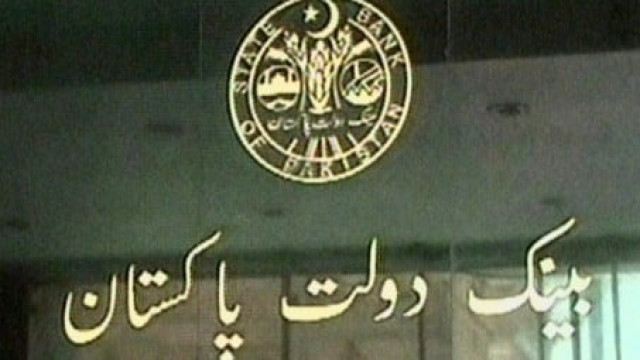Why did State Bank cut interest rate?
Inflation may rise again in second half due to base effect.

The State Bank of Pakistan (SBP) unexpectedly cut its key policy rate by 50 basis points to 13.5 per cent on Saturday, even as subsequent data showed that inflationary pressures are nowhere close to subsiding.
The move came out of the blue, startling market participants and economists who thought the central bank would maintain its tight monetary policy until inflationary pressures go down.
The bank raised the rate by 150 basis points in the first half of the 2010-11 fiscal year and held it at 14 per cent in the second half, which ended June 30.
SBP expects the inflation rate to average around 12 per cent in 2011-12, down from 13.9 per cent in the previous year. Data released on Tuesday shows annual inflation quickened to 13.77 per cent in July, from 13.13 per cent in June.
Are inflationary pressures really subsiding?
While headline inflation may show some signs of moderation in the coming months, underlying price pressures remain strong. Analysts say the government still needs to push through large increases in energy costs, especially on electricity and natural gas, to reduce its crippling subsidy bill.
Policymakers may be expecting some easing in headline numbers later in the year due to the high base effect as devastating floods pushed food prices sharply higher last year. The main inflationary pressures come from food and oil prices.
Was SBP justified in cutting rates?
Given the risks to inflation and the external account, economists reckon there is little room for further easing, although one could argue that weakness in growth and investment were becoming equally big concerns.
Still, SBP may have eased the rate a couple of months prematurely, as it is yet to be seen whether CPI falls below 13 per cent on a sustainable basis.
Some analysts said the government benefits directly through lower funding costs – through treasury bills and Pakistan Investment Bonds – and note that the heavily leveraged corporate sector, reeling from the rise in borrowing costs, especially the state-owned enterprises, could also win some respite.
The next policy move will depend on economic data over the coming two months but a further 50-basis-point cut in September cannot be ruled out as weakening growth becomes the main policy-driver.
Analysts said that it would be difficult for SBP to cut the policy rate below 13 per cent. Also, inflation is expected to rise again in the second half of 2011-12 because of the base effect.
How can inflation be controlled?
Though much of the price pressure comes from external factors, the government can only actively combat inflation by taking fiscal measures to narrow the deficit – raising revenue and cutting spending – which will reduce the need to print money to finance it.
The situation could be helped by a fall in international oil prices or by a bumper food crop globally or in Pakistan. It can also be controlled through the tightening of monetary supply which would restrict money supply.
What other risks worry policymakers?
Growth was anemic at just 2.4 per cent in 2010-11 against the target of 4.5 per cent because of floods, which caused nearly $10 billion in damage.
Large-scale manufacturing’s growth was 1.7 per cent from July 2010 through March 2011, as compared to the target of 4.9 per cent. Trade deficit is also a big worry, on account of high crude prices and falling cotton prices.
The other big worry is the lack of external funding, which has helped keep the economy afloat. The International Monetary Fund (IMF) has held back the sixth loan tranche, citing the government’s patchy implementation of fiscal reforms.
Published in The Express Tribune, August 5th, 2011.



















COMMENTS
Comments are moderated and generally will be posted if they are on-topic and not abusive.
For more information, please see our Comments FAQ